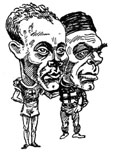
Homosexuals in the Seminary
EDITORIAL
We’ve been waiting nine long years for this document on homosexuals in the seminary. It has a long-winded title: “Instruction Concerning the Criteria for the Discernment of Vocations With Regard to Persons With Homosexual Tendencies in View of Their Admission to the Seminary and to Holy Orders” (hereafter “Concerning”).
The document was obviously written by a committee — or many committees — and it intended to satisfy as many people as possible. But we are not satisfied, not in the least.
Bear in mind that this document is about “discipline” (or shall we say ill-discipline).
The most egregious sentence is that those “who practice homosexuality” (italics added) are “profoundly respected.” So we should have profound respect for those who commit homosexual acts, which are mortal sins. By that logic, we should have profound respect for fornicators, adulterers, and child molesters.
On February 2, 1961, the Holy See promulgated a document called “Careful Selection and Training of Candidates for the States of Perfection and Sacred Orders,” signed by Pope John XXIII. The relevant section had one sentence on homosexuality: “Advancement to religious vows and ordination should be barred to those who are afflicted with the evil tendencies to homosexuality or pederasty, since for them the common life and the priestly ministry would constitute serious danger” (#30; italics added). That’s all that the new document, “Concerning,” needed to say.
So how do we go from “evil tendencies” (i.e., orientation only) to having “profound respect” for homosexual acts in “Concerning”?
Up until “Concerning,” the 1961 document was never abrogated and was still in force. Indeed, on May 16, 2002, the Vatican Congregation for Divine Worship and the Discipline of the Sacraments reiterated the policy: “Ordination to the diaconate and the priesthood of homosexual men or men with homosexual tendencies is absolutely inadvisable and imprudent and, from the pastoral point of view, very risky. A homosexual person, or one with a homosexual tendency is not, therefore, fit to receive the sacrament of Holy Orders.” It was published in the November-December issue of Notitiae, which means it is the position of the Holy See. Of course, this policy had been and continued to be violated by many bishops, major superiors, seminary rectors, and vocations directors.
You May Also Enjoy
Fr. Paul Shaughnessy blows the lid off the homosexualist subculture in the priesthood.
Archbishop Weakland empties Church coffers for his...uh, young male lover.
Apart from the possible connection to Francis’s old pal McCarrick, McElroy is basically a Francis clone. He’s parroted the Pope’s pet projects at nearly every turn.

